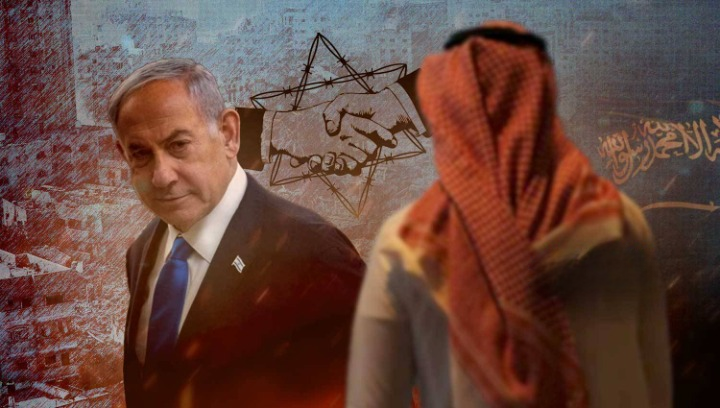Saudi Arabia Against Gaza: Suppressing Free Voices and Normalizing Palestinian Blood
At a time when the voices of Arab and Muslim nations rise in solidarity with Gaza and the Palestinian resistance, Saudi Arabia stands on the opposite side of history and identity — transforming from the land of the Two Holy Mosques into a silent platform before the massacres.
The kingdom has forbidden prayers for Palestine and arrested anyone who raises a slogan or a supplication for Gaza in the courtyards of the Grand Mosque or on the streets of Mecca and Medina.
The Pulpit of the Haram: Between Restriction and Repression
Since the launch of Operation “Al-Aqsa Flood” on October 7, 2023, the peoples of the region have chanted for Palestine — while Saudi authorities have tightened their grip on anyone showing sympathy for the resistance or praying for the people of Gaza.
Friday preachers have been banned from mentioning the word “Gaza” in sermons, and imams have been forced to remove any supplications for the victory of the mujahideen — a scene that sums up the moral and spiritual deviation from both Quranic and human principles.
Even the Great Mosque of Mecca, once the refuge of the Muslim world’s heart, is now under strict surveillance. Takbirs and prayers for Palestine are prohibited, and anyone who raises their voice for truth or invokes relief for Gaza faces arrest.
Arresting Palestinians: Punishing Loyalty to Justice
The Saudi crackdown has not stopped at silencing local voices.
It has extended to arresting Palestinian residents in the kingdom — some of them longtime workers in charitable and educational institutions — whose only “crime” is rejecting normalization and affirming that resistance is a legitimate right.
Many have been detained for years without fair trial, charged falsely with “sympathy for terrorist organizations.”
In reality, their only “offense” is their fidelity to Palestine and their moral refusal to abandon it.
Demonizing the Resistance: Saudi Media in Service of Zionism
Meanwhile, Saudi-funded media outlets have turned into soft-normalization platforms, spreading venom against resistance movements and distorting the image of fighters in Palestine, Yemen, and Lebanon.
They employ the same “terrorism” rhetoric repeated by Washington and Tel Aviv — serving as an echo chamber for the occupier’s narrative.
This propaganda coincides with growing informal ties and cultural exchanges with the Zionist entity — quiet normalization cloaked in diplomatic and entertainment initiatives — even as Palestinians continue to pay the price in blood and ruin.
Between the Official and the Popular Stance
Despite the iron-fisted security apparatus, the popular conscience across the Arabian Peninsula has not died.
Many citizens have expressed their rejection of official silence through social media, affirming that Palestine is a matter of faith, not politics, and that repression cannot change the truth:
“Jerusalem unites us — no matter how much the normalizers sell their souls.”
The Resistance Axis: The Living Voice of the Nation
In contrast, the Axis of Resistance — from Sana’a to Gaza, from Beirut to Tehran — continues to prove that dignity cannot be bought with silence, and that nations can break through fear and submission.
It has become clear to all peoples who truly stands with Palestine — and who stands against it, even if cloaked in the robes of religion.
Gaza: A Flame That Never Dies in the Heart of the Ummah
Banning prayers for Gaza in the Grand Mosque is more than a security measure — it is a spiritual rupture from the causes of the nation and a dangerous alignment with the Zionist project, which seeks to strip peoples of their identity and principles.
But history will record:
Those who remained silent over Jerusalem’s oppression have written their names in the book of betrayal.
Those who stood with Palestine — even with a word — will remain in the ranks of dignity.
Gaza will endure as a flame that never dies in the conscience of the Ummah, a symbol of steadfastness and resistance until the dawn of victory rises.

